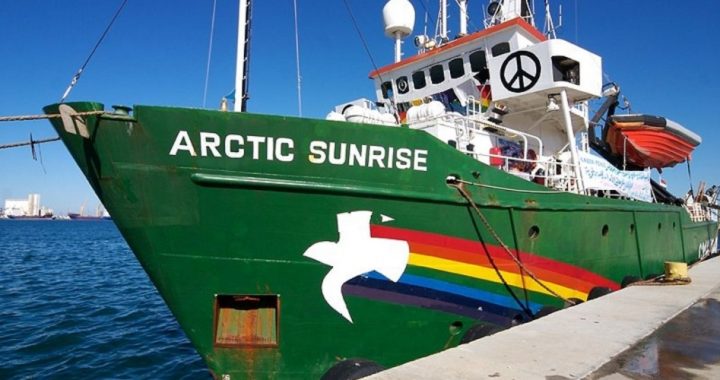
Liesbeth Lijnzaad, an aide to the Netherlands’ Ministry of Foreign Affairs, testified today before the judges at the International Tribunal for the Law of the Sea in Hamburg, Germany, asking the tribunal to order the release of a Greenpeace ship and 30 of its crew members detained by Russia. Lijnzaad requested that the UN body grant an interim order to safeguard the crew’s “rights of liberty and security.”
“They have been held for almost six weeks now,” said Lijnzaad, adding that Russian arguments to keep them are “evidently unfounded.”
The tribunal adjudicates maritime disputes under the 1982 United Nations Convention on the Law of the Sea, to which both Russia and the Netherlands are party.
The Greenpeace ship, Arctic Sunrise, which sails under a Dutch flag, was seized by the Russian Coast Guard in international waters north of the Russian city of Murmansk on September 18. On that day, the crew of the ship circled the Prirazlomnaya oil rig constructed in the Pechora Sea by Russia’s Gazprom energy company, and three of the ship’s crew members attempted to board the platform.
In response, the Russian Coast Guard seized the activists and had the ship towed to the port of Murmansk. Though the ship’s crew initially was accused of piracy, even Russian President Vladimir Putin said the activists were obviously “not pirates,” and the charges were reduced to “hooliganism.”
“We are very grateful to the Dutch government for bringing this case and to the tribunal for considering it,” Jasper Teulings, the international general counsel for the Dutch-based Greenpeace organization, was quoted as saying by al Jazeera.
“The argument of the Netherlands is that in international waters, ships have the right to freedom of navigation and so this means they may not be boarded, inspected, detained or arrested except with the permission of the flag state. There are exceptions to this, but they are limited,” Teulings added.
Al Jazeera reported that Russian Prime Minister Dmitry Medvedev, in a statement last week, reiterated his government’s position that Greenpeace posed a threat to the security of Russian workers and the environment by disturbing work at the platform.
On November 6, other Greenpeace activists sailed a motorboat on the Moscow River past the Kremlin holding yellow flags which read, “Free the Arctic 30,” a reference to the 30 Arctic Sunrise crew members being detained, reported the Moscow Times.
The Times noted that last month the Russian Foreign Ministry refused to recognize the Law of the Sea tribunal’s authority and declared that Russia will proceed with plans to prosecute the activists. As a result, Russia did not participate in Wednesday’s hearing, even though one of the 21 judges on the tribunal is Russian.
“This is a big problem, but we have to start the proceedings, even without the participation of Russia,” tribunal chairman Shunji Yanai observed.
A report from Russia’s RT news network back on October 23 quoted from the Russian Foreign Ministry statement that it would not participate in the tribunal:
The Russian side has informed the Netherlands and the International Tribunal for the Law of the Sea that it does not accept the arbitration procedure in the Arctic Sunrise case, and is not planning to take part in the hearing.
RT noted that Russia pointed out that back in 1997, when it ratified the United Nations Convention on the Law of the Sea, it refused to acknowledge the settlement procedures, which result in mandatory decisions in disputes over sovereign rights and jurisdictions.
“That is exactly the kind of jurisdiction that we are exercising in the Arctic Sunrise case,” said the ministry. “Greenpeace’s activists violated Russian law in an exclusive economic zone and continental shelf when staging their protest against the Prirazlomnaya oil rig,” RT further paraphrased the statement.
A November 6 report from Russia’s RIA Novosti cited a statement from Greenpeace’s Twitter feed saying that it was the first time in the history of the Law of the Sea tribunal that a country involved in the trial had failed to attend.
RIA Novasti also quoted from the Russian Foreign Ministry’s statement that the country does not have to participate in disputes that concern “sovereign rights” and “jurisdiction.”
Unlike Russia, the United States has never signed the United Nations Convention on the Law of the Sea, making it one of the few non-land-locked countries to decline — the others being Eritrea, Israel, Peru, Turkey, and Venezuela. The last time the treaty was even considered by the U.S. Senate, on July 16, 2012, 34 Republican senators indicated their intention to vote against ratification of the treaty if it came to a vote. Since a positive vote by at least 67 senators is required to ratify a treaty, the vote was indefinitely delayed.
One reason for the difficulty faced by the Law of the Sea Treaty (LOST) supporters to gain any traction in the Senate has been the continued educational campaigns warning against the convention’s threat to national sovereignty waged by constitutionalist activist groups, such as The John Birch Society (with which The New American is affiliated).
As one example of The John Birch Society’s activism against LOST, the society posted this statement on its website, headlined, “Obama, Clinton, Senate Poised to Give the UN Control of Everything About the Oceans by Ratifying the Law of the Sea Treaty (LOST),” which quoted a statement made to honor the UN document “25th Anniversary of the United Nations Convention on the Law of the Sea” published on Oct. 17, 2007:
The United Nations Convention on the Law of the Sea … is perhaps one of the most significant but less recognized 20th century accomplishments in the arena of international law…. Its scope is vast: it covers all ocean space, with all its uses, including navigation and overflight; all uses of all its resources, living and non-living, on the high seas, on the ocean floor and beneath, on the continental shelf and in the territorial seas; the protection of the marine environment; and basic law and order…. The Convention is widely recognised by the international community as the legal framework within which all activities in the oceans and the seas must be carried out.
The JBS commentary that followed noted:
If you read the quote carefully, you’ll see that the UN Division for Ocean Affairs and the Law of the Sea which administers LOST would have authority over everything, everything, over, on, and under the oceans and seas of the world. Ratification of LOST would be a very large step toward world government. And, remember under the UN division that administers LOST, our nation wouldn’t have veto power like we do in the UN Security Council. We’d have just one vote among 150 or more votes. Just as the League of Nations ultimately fell apart without the United States, let’s stay out of the UN’s LOST regime, thus denying its legitimacy.
Whether Russia’s actions against the Greenpeace activists were excessive or not does not change the fact that LOST presents an ongoing threat to the sovereignty of every nation that accedes to it. Those who cherish U.S. sovereignty and do not wish to surrender control of U.S. waters to the UN Division for Ocean Affairs and the Law of the Sea must resist all efforts to subject the United States to the dictates of this body.



